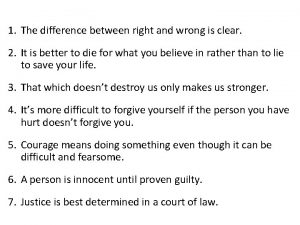Torture in International Law Definition of torture Distinction







- Slides: 7

Torture in International Law

Definition of torture • Distinction between torture vs. inhuman and degrading treatment or punishment, but no definition: ICCPR, ACHR, ACh. HPR, CRC, ECHR • Definition of torture provided by UN Convention Against Torture (CAT), ICC Statute, Inter-American Torture Convention

Convention against Torture and Other Cruel, Inhuman or Degrading Treatment or Punishment Article 1 1. For the purposes of this Convention, the term "torture" means any act by which severe pain or suffering, whether physical or mental, is intentionally inflicted on a person for such purposes as obtaining from him or a third person information or a confession, punishing him for an act he or a third person has committed or is suspected of having committed, or intimidating or coercing him or a third person, or for any reason based on discrimination of any kind, when such pain or suffering is inflicted by or at the instigation of or with the consent or acquiescence of a public official or other person acting in an official capacity. It does not include pain or suffering arising only from, inherent in or incidental to lawful sanctions.

Rome Statute of the International Criminal Court Art. 7(2)(e): "Torture" means the intentional infliction of severe pain or suffering, whether physical or mental, upon a person in the custody or under the control of the accused; except that torture shall not include pain or suffering arising only from, inherent in or incidental to, lawful sanctions;

Inter-American Convention to Prevent and Punish Torture Article 2 For the purposes of this Convention, torture shall be understood to be any act intentionally performed whereby physical or mental pain or suffering is inflicted on a person for purposes of criminal investigation, as a means of intimidation, as personal punishment, as a preventive measure, as a penalty, or for any other purpose. Torture shall also be understood to be the use of methods upon a person intended to obliterate the personality of the victim or to diminish his physical or mental capacities, even if they do not cause physical pain or mental anguish. The concept of torture shall not include physical or mental pain or suffering that is inherent in or solely the consequence of lawful measures, provided that they do not include the performance of the acts or use of the methods referred to in this article.

Prohibition of torture as a jus cogens norm International criminal law International human rights law • Prosecutor v. Furundžija (para. 153) • Regina v. Bow Street Metropolitan Stipendiary Magistrate, ex parte Pinochet Ugarte (paras. 197 – 198) • Filártiga v Peña-Irala (paras. 884 – 885). • UN Committee against Torture (GC No. 2, para. 1) • Human Rights Committee (GC No. 24, para. 10) • UN Special Rapporteur on Torture reports • ECHR, Al-Adsani v. the United Kingdom (paras. 60 – 61)

Specifications of Prohibition of Torture Non refoulement Interrogations and conditions of detention Law of armed conflict and international humanitarian law Psychiatri c patients













